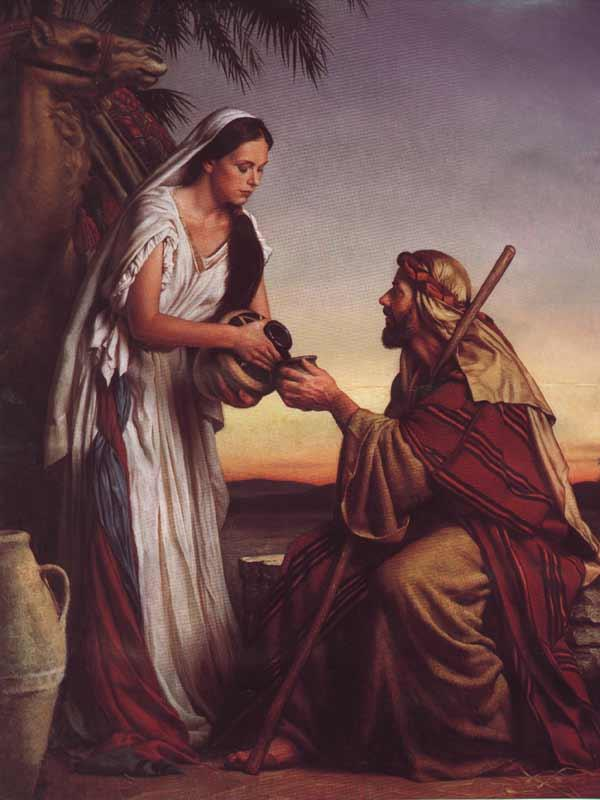Betrothal
The Correspondence of Betrothal
And I will betroth thee to Me for eternity; and I will betroth thee to Me in justice and in judgment, and in mercy and in compassions. ( Hosea 2:19 )
AR 688:2. Since the Lord is the Divine good and the Divine truth, and since by “judgment” is signified the Divine truth, and by “justice” the Divine good, therefore, in many passages where the Lord is spoken of, “justice and judgment” are mentioned.
AC 3132:2. The conjunction of Divine good and Divine truth in the Lord is the very Divine marriage from which is the heavenly marriage, which is likewise a marriage of good and truth; from this also comes conjugial love (see n. 2727–2759). Hence it is that where marriage is treated of in the Word, in the internal sense there is signified the heavenly marriage, which is that of good and truth; and in the supreme sense the Divine marriage, which is in the Lord. Therefore nothing else is here meant by the marriage between Isaac and Rebekah. The conjunction of good and truth is the marriage itself, but the initiation is the betrothal, or the state preceding marriage. But the state that precedes betrothal is what is here described. As in this state it is within the power of the maiden to be betrothed, and afterwards as a wife to be conjoined with a husband, so it is within the power of the affection of truth to be initiated into Divine truth, and in this manner to be conjoined with Divine good. And further: in the first affection and afterwards in every affection of truth with the Lord, there was inmostly the Divine good itself and the Divine truth itself, because there was Jehovah Himself; from this came the power that is here treated of.
DLW 402. (4) Love or the will prepares a house or bridal chamber for its future married partner, which is wisdom or the understanding. In the created universe and in each of its particulars, there is a marriage of good and truth; and this is so because good is of love and truth is of wisdom, and these two are in the Lord, and out of Him all things are created. How this marriage comes into existence in man can be seen mirrored in the conjunction of the heart with the lungs, since the heart corresponds to love or good, and the lungs to wisdom or truth (see above, n. 378–381, 382–385). From that conjunction it can be seen how love or the will betroths to itself wisdom or the understanding, and afterwards weds it, that is, enters into a kind of marriage with it. Love betroths to itself wisdom by preparing for it a house or bridal chamber, and marries it by conjoining it to itself by affections, and afterwards lives wisely with it in that house. How this is cannot be fully described except in spiritual language, because love and wisdom, consequently will and understanding, are spiritual; and spiritual things can, indeed, be expressed in natural language, but can be perceived only obscurely, from a lack of knowledge of what love is, what wisdom is, what affections for good are, and what affections for wisdom, that is, affections for truth, are. Yet the nature of the betrothal and of the marriage of love with wisdom, or of will with understanding, can be seen by the parallel that is furnished by their correspondence with the heart and lungs. What is true of these is true of love and wisdom, so entirely that there is no difference whatever except that one is natural and the other spiritual. Thus, it is evident from the heart and lungs that the heart first forms the lungs, and afterwards joins itself to them. It forms the lungs in the fetus, and joins itself to them after birth. The heart does this in its abode which is called the breast, where the two are encamped together, separated from the other parts of the body by a partition called the diaphragm and by a covering called the pleura. So it is with love and wisdom or with will and understanding.
Questions
- As we have seen, the Isaac and Rebekah story in Genesis 24 contains within it teachings about betrothal as it applies between a man and a woman in the context of conjugial love, as it applies to the will and the understanding in the context of regeneration and as it applies to the Lord in the context of His glorification (see AC 3011–3212). Do these different focuses help or confuse your understanding of betrothal?
- How does DLW 402 help us understand the different qualities that men and women bring to marriage?
- How does DLW 402 fit together with CL 393? “The sphere of conjugial love is received by women, and through women is transferred to men, and this because women are born loves of the understanding of men and the understanding is a recipient.”
| previous |  |
next |
|---|
 New Church Day Readings
New Church Day Readings


